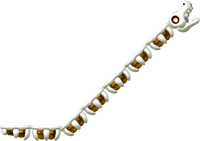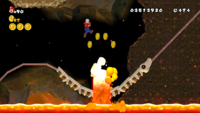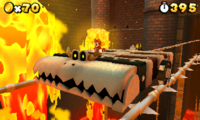Spine Coaster
| Spine Coaster | |||
|---|---|---|---|
 Model from New Super Mario Bros. U | |||
| First appearance | New Super Mario Bros. Wii (2009) | ||
| Latest appearance | New Super Mario Bros. U Deluxe (2019) | ||
| Effect | Transports characters through otherwise uncrossable gaps | ||
| |||
Spine Coasters are rideable creatures made of bone used to aid Mario and company to pass through lava pits or poison pools or to cross long gaps. As their name suggests, they move along a track in a similar fashion to a roller coaster. They first appear in New Super Mario Bros. Wii.
History[edit]
New Super Mario Bros. Wii[edit]

Spine Coasters appear in World 8-7 from New Super Mario Bros. Wii, a stage that can be unlocked by finding the secret exit in World 8-2. It also appears in multiplayer versus mode. Spine Coasters are the only method of transportation throughout the level, and they often make risky maneuvers, passing through lava geysers and into the lava itself. Players must time their jumps to avoid coming in contact with the lava and losing a life.
Super Mario 3D Land[edit]
Spine Coasters later appear in Super Mario 3D Land, where they are only found in World 8-![]() Bowser's Castle 2. Their design has changed into a broader, three-dimensional figure. The skull has protruding eye sockets and horns, and its maw is wide and blunt (as opposed to the narrow and pointed maw from the New Super Mario Bros. Wii design), to match with the coaster's wider figure. It also has a small tail on the back. This alternate design for the skull somewhat resembles the thumb and bucket of an excavator, as well as the skull of a Dry Bones.
Bowser's Castle 2. Their design has changed into a broader, three-dimensional figure. The skull has protruding eye sockets and horns, and its maw is wide and blunt (as opposed to the narrow and pointed maw from the New Super Mario Bros. Wii design), to match with the coaster's wider figure. It also has a small tail on the back. This alternate design for the skull somewhat resembles the thumb and bucket of an excavator, as well as the skull of a Dry Bones.
New Super Mario Bros. U / New Super Luigi U / New Super Mario Bros. U Deluxe[edit]
In New Super Mario Bros. U, Spine Coasters appear in two levels: the Rock-Candy Mines level Thrilling Spine Coaster, a course similar to the world shown in New Super Mario Bros. Mii, and the Superstar Road course, Spine-Tingling Spine Coaster. Spine Coasters and Spine Coaster tracks also appear on the world map, and can be used to travel between Frosted Glacier and Rock-Candy Mines. In New Super Luigi U, besides reprising their role on the world map, Spine Coasters appear in the levels Spine Coaster Stowaways and Spine Coaster Connections.
Spine Coasters reprise the aforementioned roles in New Super Mario Bros. U Deluxe.
Other appearances[edit]
Spine Coasters have also appeared in the Wii U demo New Super Mario Bros. Mii shown at E3 2011. One is seen in a dark cavern that is filled with poison, carrying Mario and friends once again.
Gallery[edit]
Naming[edit]
Internal names[edit]
| Game | File | Name | Meaning
|
|---|---|---|---|
| Super Mario 3D Land | romfs/ObjectData/BoneRollerCoasterParts.szs | Bone Roller Coaster | - |
Names in other languages[edit]
| Language | Name | Meaning | Notes |
|---|---|---|---|
| Japanese | ほねコースター[1] Hone Kōsutā |
Bone Coaster | |
| リフト[2] Rifuto |
Lift | Super Mario 3D Land | |
| Chinese | 白骨过山车[?] Báigǔ Guòshānchē |
Bone Coaster | |
| French | Serpentos[?] | From serpent (snake) and os (bone) | |
| Italian | Carrosso[?] | Cart-bone | |
| Korean | 뼈다귀코스터[?] Ppyeodagwi Koseuteo |
Bone Coaster | |
| Portuguese | Trólei Vertebrado[?] | Vertebrate Trolley | |
| Spanish (Latin American) | Huesocarril[?] | From hueso (bone) and carril (rail) | |
| Spanish (European) | Osteotrén[?] | From ósteo (prefix that means "bone") and tren (train) |
Notes[edit]
- The Spine Coaster somewhat resembles a Bone Dragon, but its head is smaller and there are no spikes on its back.
- Whenever the Spine Coaster goes fast, especially on a slope, it lets out a dinosaur-like roar. The Spine Coasters in Super Mario 3D Land make a different noise.

